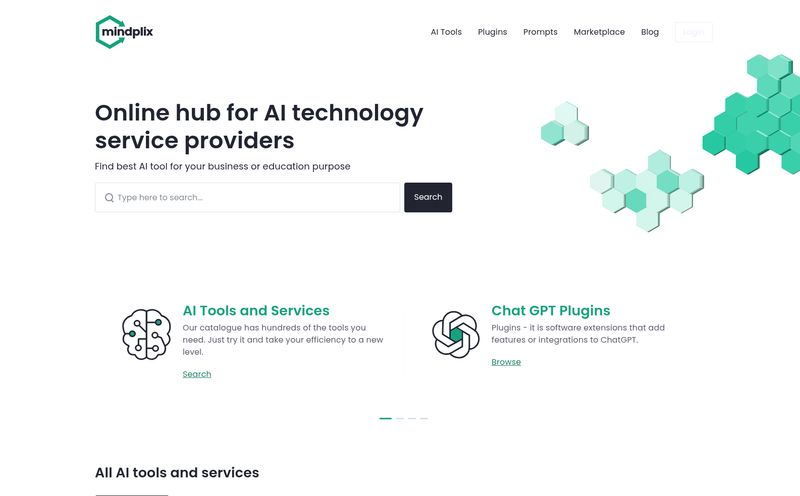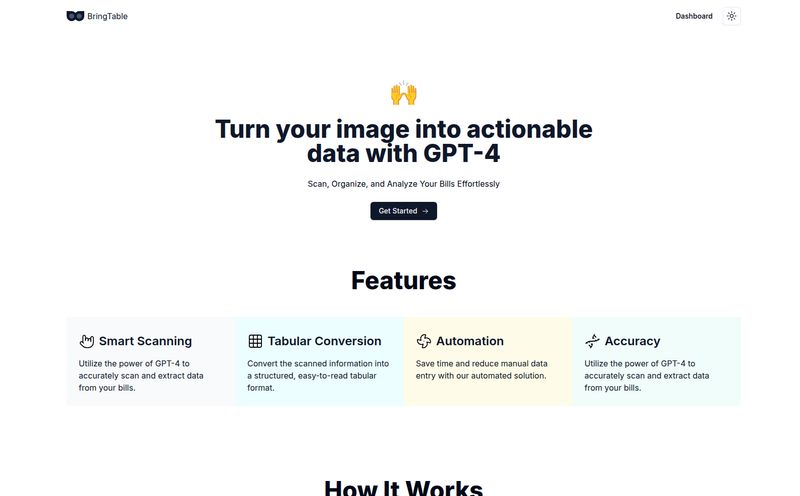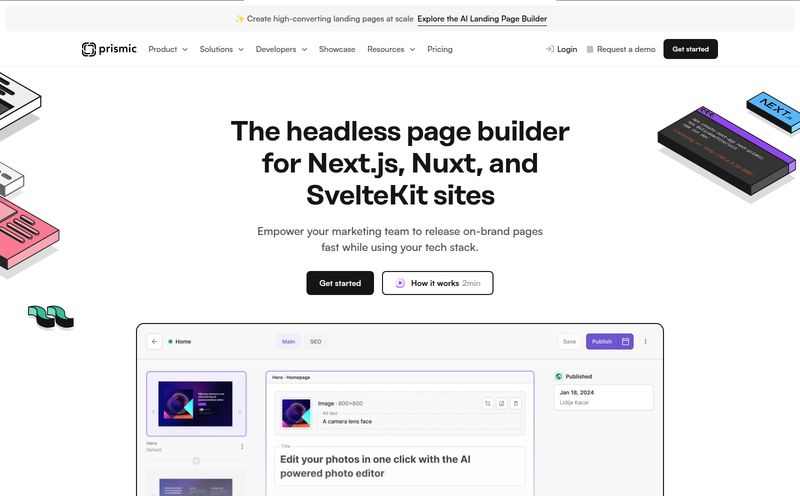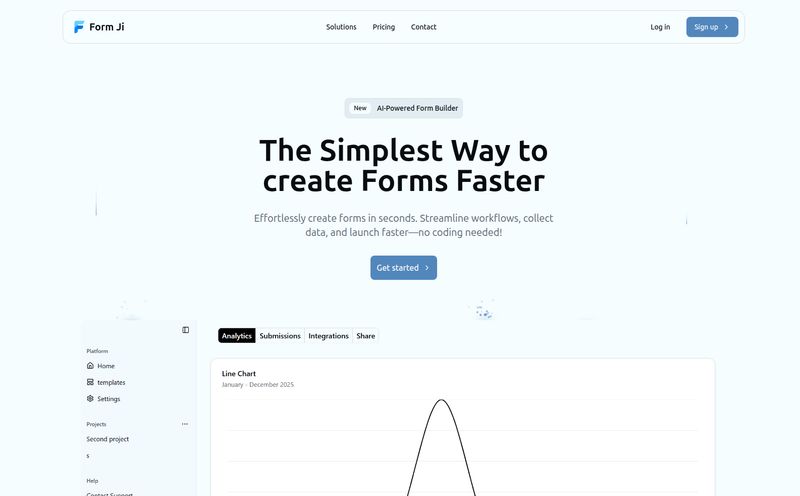If you’ve ever tried to build... well, anything digital, you’ve probably run into the data headache. You’ve got user comments in one place, product info in a CSV file, maybe some analytics living in a separate database, and a bunch of JSON files you inherited from a project you’d rather forget. Getting them all to talk to each other can feel like trying to host a dinner party where none of the guests speak the same language. It’s a mess of different APIs, authentication keys, and a whole lot of frustration.
I see new tools promising to solve this every week. Most of them are just another layer of complexity. So, when I stumbled upon a new player called QuickData Cloud, my default skepticism kicked in. But then I saw their core promise, and I have to admit, it made me lean in a little closer. They’re talking about managing all those different data types from one spot, through one single API. For a no-code world? That's a pretty big claim.
So, What Exactly is QuickData Cloud?
At its heart, QuickData Cloud is a no-code platform designed to be a universal translator for your data. Imagine taking all your different data sources—text, books, CSVs, comments, databases, JSON files—and plugging them into one central hub. From that hub, you get a single, clean API endpoint to access everything. No more juggling a dozen different API keys and documentation pages.
It's built for the modern creator, the citizen developer, the small business owner who needs data to work for them without hiring a whole back-end team. The whole idea is to remove the technical barrier, the coding gatekeeper, that so often stands between a great idea and a finished product. It’s about making data management less about programming and more about… well, just managing the data.
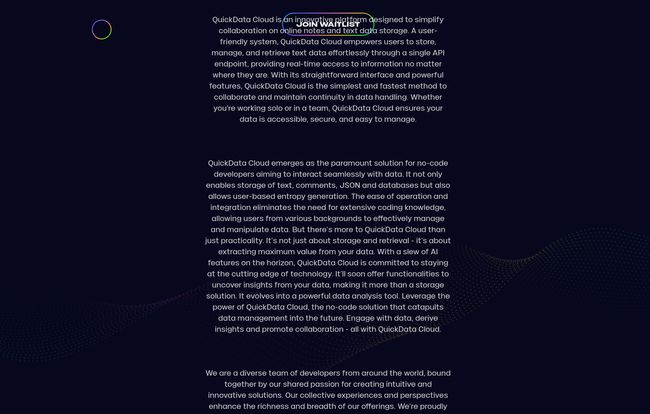
Visit QuickData Cloud
The Magic Behind That Single API
Okay, the “single API endpoint” is the real star of the show here. For anyone who hasn't felt this pain, let me paint a picture. Traditional development is like having a separate key for your house, your car, your office, and your gym locker. It works, but it’s clunky. You’re always fumbling for the right one. A single API endpoint is like having one master key that securely opens every door you need it to. It's an incredible simplification of a process that is often, frankly, a massive pain.
This approach means you can pull user feedback and product inventory from the same place with the same set of rules. It makes building dashboards, running reports, or feeding data into an app ridiculously straightforward. This is one of those quality-of-life improvements that seems small on paper but can save dozens, if not hundreds, of hours of development time and prevent countless headaches. It lowers the barrier to entry, and in my book, that’s always a good thing.
Let’s Talk About The AI Features
Of course, it's 2024, you can’t launch a tech platfrom without mentioning AI. QuickData Cloud says it has AI features for data analysis. The details on their site are a little… sparse, I’ll be honest. They talk about delivering AI solutions that are efficient and client-centric, which sounds great, but what does it do?
My guess? We're probably looking at things like sentiment analysis on user comments, automated data categorization, or maybe even predictive modeling based on your datasets. The potential is definitely there. One feature they do mention is something called “user-based entropy generation.” Now, that sounds like something straight out of a sci-fi novel, but it’s actually a really interesting security concept. In simple terms, it likely uses a user's own unique, random data or behavior to create stronger, more unpredictable encryption keys. It’s a clever way to bolster security, and it shows they’re thinking about privacy from the ground up, which I appreciate.
Who Is This Platform Actually For?
While a seasoned developer could certainly find value in the simplification QuickData Cloud offers, I don’t think they’re the primary audience. This feels tailor-made for the no-code and low-code movement. Think about:
- The Solopreneur: Building an app with Bubble or Webflow and needs a simple, scalable backend for their data without writing a line of Python.
- The Project Manager: Needs to aggregate data from multiple team sources into a single dashboard but doesn’t have the technical chops to stitch together APIs.
- The Small Agency: Building small-scale websites or apps for clients and needs a repeatable, easy-to-manage data solution.
- The Data Hobbyist: Someone who just wants to play around with datasets without spinning up a full server and database environment.
It’s a tool for builders and doers who are more focused on the what than the how. They want to create something cool, and this platform aims to get the technical cruft out of their way.
The Good, The Bad, and The Brand New
No tool is perfect, especially a new one. I believe in a balanced view, so here's my take on where QuickData Cloud shines and where you should be a bit cautious.
What I Really Like About QuickData Cloud
The biggest pro is the sheer simplicity of the concept. Consolidating data access into a single API is a genuinely powerful idea that solves a real-world problem. I've spent too many hours of my life wrestling with OAuth 2.0 for five different services; the appeal is immediate and strong. The emphasis on collaboration and data continuity is also smart. It’s designed for data to be used and shared, not just stored and forgotten. It feels modern in its approach.
Some Things to Keep in Mind
On the flip side, this is a very new company. They were founded in 2023, which means the platform is still in its infancy. With any new tool, there's a risk. Will they be around in five years? Is the platform fully mature? These are fair questions. For a mission-critical enterprise application, you might hesitate. For a new project, a startup, or an internal tool? The risk is much lower and the potential reward is much higher. You get to grow with a platform and maybe even help shape its future.
And then there’s the pricing…
What About the QuickData Cloud Pricing?
This is my biggest pet peeve with new SaaS companies. The pricing information for QuickData Cloud isn't publicly available on their site. You have to get in touch with them. I get it from their perspective—they might be targeting enterprise clients with custom needs or they're still fine-tuning their pricing tiers. But as a potential user, it's a barrier. I want to know if a tool is in my ballpark before I invest time in a demo or a sales call.
My hope is that they'll introduce some clear, transparent pricing tiers soon, perhaps with a free or developer-focused plan to let people kick the tires. For now, if you're interested, you’ll have to reach out to them directly.
Is QuickData Cloud Worth a Look?
So, we circle back to the original question. Is this the no-code data platform we’ve all been waiting for? It just might be. Or at least, it’s a very, very interesting step in the right direction. It’s tackling a real, nagging problem with an elegant and simple-sounding solution.
The newness is a double-edged sword, and the lack of public pricing is a hurdle. But the core idea is so compelling that I can’t help but be optimistic. For anyone in the no-code space, or anyone simply tired of API juggling, QuickData Cloud is a name you should absolutely keep on your radar. I know I will be. It's one of those tools that, if they get it right, could quietly become an indispensable part of the modern creator's toolkit.
Frequently Asked Questions
What is QuickData Cloud in simple terms?
Think of it as a universal adapter for all your different types of data. It gives you one central place and one single, simple API to store, manage, and retrieve data like CSVs, JSON, and text, without needing to write complex code.
Do I need to know how to code to use QuickData Cloud?
No, that's the main appeal! It's designed as a "no-code" platform, meaning you can manage your data infrastructure without deep programming knowledge. It’s aimed at creators, entrepreneurs, and managers who want to work with data easily.
What makes the single API so special?
It drastically simplifies development. Instead of managing different keys, authentication methods, and rules for multiple data sources, you have one consistent and predictable way to access all of your data. This saves time, reduces errors, and lowers the technical barrier to building apps.
Is QuickData Cloud free to use?
The company hasn't published its pricing information publicly. You'll need to contact them directly to get details on costs, which may mean they offer custom plans based on your usage and needs.
How does QuickData Cloud handle data security?
They emphasize integrity and privacy. One of their stated features is "user-based entropy generation," which is an advanced method for creating strong, unique encryption keys based on user-specific randomness, making data more secure.
Who are the people behind QuickData Cloud?
According to their website, QuickData Cloud was built by a diverse, global team of developers and innovators who want to simplify the development and coding ecosystem for everyone, especially those without a deep technical background.
Reference and Sources
- QuickData Cloud Official Website (Note: A direct link was not provided, but one would assume it's at a URL like `quickdatacloud.com`)
- Forbes: The Rise Of The Citizen Developer And The Future Of Programming
